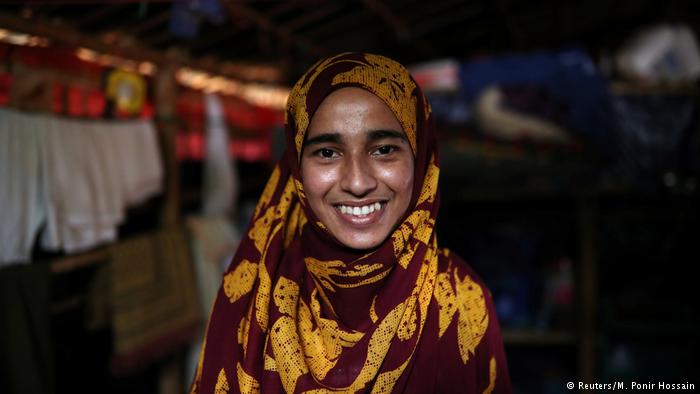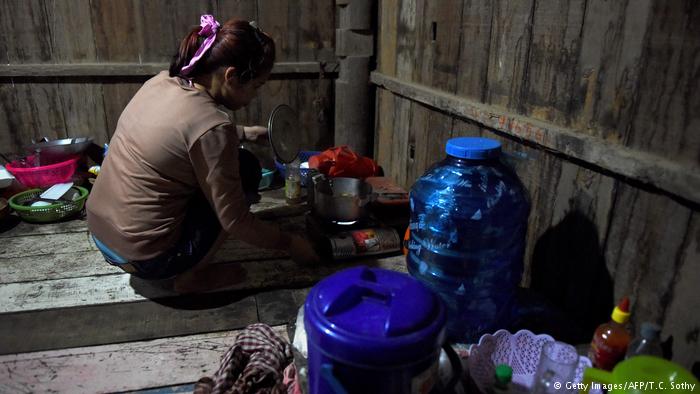What if women ruled the world?

Total of 2981 women from Syria and Kilis gather to collect signature in Turkey’s Kilis on February 2, 2016 to invite German Chancellor Angela Merkel to Turkey’s Kilis for the International Women’s Day (IWD) on March 8, 2016.
Many a time I’ve entertained this intriguing possibility: often, admittedly, as a knee-jerk reaction to the rhetoric of certain male leaders that continues to “shock and awe” us.
This question came to mind again during the United Nations General Assembly when catchphrases such as “total destruction” and “dog’s barks” hogged the world’s headlines, shadowing the far more pressing issues facing humanity.
Al Jazeera’s interview with Bangladeshi Prime Minister Sheikh Hasina also prompted me to imagine a world ruled by women. When questioned why she had decided not to ask the president of the United States for aid to deal with the “influx” of Rohingya refugees into her country, she explained that he had demonstrated a lack of interest in the issue and she had been put off from even broaching the subject.
“If we can feed 160 million people, another 500 or 700,000 people, we can also do. We can share our food,” she said.

On Sept. 22, 2017 Sheikh Hasina, prime minister of Bangladesh, addresses the 72nd session of United Nations General Assembly
That line resonated with me. Just like German Chancellor Angela Merkel’s “Wir schaffen das” (or “We can do it”) struck a chord back in 2015, since when many others have questioned the wisdom of allowing close to 800,000 refugees from war-torn countries into Germany. (Merkel’s persistence has not convinced everybody. Although her win in the upcoming federal election on Sunday is a foregone conclusion, various state elections have seen voters casting their ballots for the far-right AfD party which has been actively engaged in fear-mongering with regard to “foreigners” in Germany.)
I’m willing to be corrected, but I’m hard-pressed to find a modern-day male leader who has been equally persistent and uttered similar words particularly within the specific context of sharing the national pie with total strangers.
Detractors may dismiss Hasina’s statement as mere grandstanding. Whether she meant it or not, the line is in stark contrast to her female de facto counterpart in Myanmar, Nobel laureate Aung San Suu Kyi, who has been on the receiving end of much criticism for her less compassionate stance towards the Rohingyas.
Which makes the question, “What if women ruled the world?” even more intriguing.
Studies have shown that women do govern differently than men in some important ways and that they show a higher tendency to be collaborative and also to support others, especially women. Female lawmakers in the US, for instance, tend to push for more policies to support women, children, health, education and social welfare.
Women are also less likely to vote for the death penalty or war; this is, however, not necessarily the case when they are at the helm of power. Notorious female leaders of the past – Margaret Thatcher, Golda Meir and Indira Gandhi – all governed in conflicts “and were described as governing like men,” with researchers partially attributing this to “a need to overcome stereotypes of women as weak.”
It has also been often noted that the strength of women leaders lies elsewhere and often behind the scenes. “A variety of research has found that women interrupt less (but are interrupted more), pay closer attention to other people’s nonverbal cues and use a more democratic leadership style compared with men’s more autocratic style. The result is that women build coalitions and reach consensus more quickly.” I think it would be safe to say that this has pretty much been Merkel’s standard operating procedure.

Aung San Suu Kyi addresses the 71st United Nations General Assembly in Manhattan, New York, U.S. September 21, 2016.
Michael A. Genovese, director of the Institute for Leadership Studies at Loyola Marymount University who has studied gender and leadership, has been quoted as saying, “Women share their power more; men guard their power.”
Naturally, there is no clear delineation between male and female governing styles and one cannot discount social conditioning, culture and education. Gender can never be the sole marker for a person’s actions and reactions.
But in my utopian world run by women, I dream of hoping that there would be less political grandstanding and more pragmatic action.
In my utopian world, war would be a matter of last resort (if it took place at all); and talk of war would not be treated in such blasé fashion. And there wouldn’t be weapons of mass destruction or wars begun in search of such weapons.
There would be equal and diverse representation of women AND men in all aspects of life. For that is after all the original premise of feminism: to be inclusive and equal, regardless of gender.
And sexual offenses of any kind would be banned. As I said, pretty utopian but as one of my favorite singers John Lennon once wrote: “You may say I’m a dreamer, but I’m not the only one.” His words still ring true so many decades later.
For now though, we can only watch and wonder. And cheer the women who dare defy this man’s world.
Author: Brenda Haas
Editor: Anne Thomas
_____
WTO RECOMMENDS
Angela Merkel – Sticking to Her Stance against All Odds
Germany has been facing huge problems in regard to refugees that have been arriving in the country since last year. One might say, all this is caused by Chancellor Angela Merkel’s policy of accepting refugees and refusing to define a maximum number of refugees Germany will allow into the country. In this regard Germany stands very much alone in the European Union.
Angela Merkel: The most important moments of the ‘Person of the Year’
TIME has named German Chancellor Angela Merkel its ‘Person of the Year’. Merkel is the first woman named Person of the Year in three decades. The New York-based news magazine praised her leadership on a range of issues, including her handling of the refugee crisis and helping keep Greece in the Eurozone.
Opinion: America’s fear has a new name – Angela Merkel
Donald Trump has described Hillary Clinton as the American Angela Merkel, hoping to cast his rival in a role that feeds the deepest fears of xenophobes, writes DW’s Ines Pohl.






